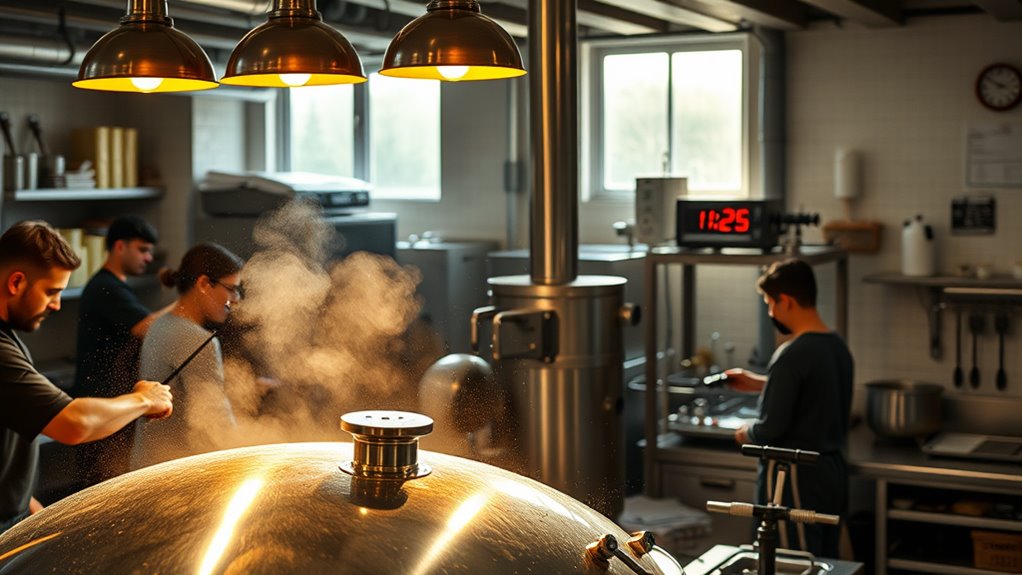Yes, a boiler can often be fitted in a day, but it depends on various factors. The type of boiler you choose, the complexity of the installation, and your existing heating system all play a role in the timeline. If extensive plumbing or electrical work is needed, it may take longer. Preparing your home for the technician and understanding the installation process can help guarantee a smooth experience. There's more to contemplate to make it efficient and effective.
Key insights
- Installation can typically be completed in a day, especially for straightforward replacements of existing systems.
- Combi boilers often have quicker installation due to their compact design and fewer components.
- Complexity of the installation, such as extensive plumbing or electrical work, may extend the timeline beyond one day.
- The condition of existing infrastructure can affect how quickly the new boiler can be integrated.
- Preparation and accessibility of the installation site can significantly speed up the overall process.
Understanding Different Types of Boilers
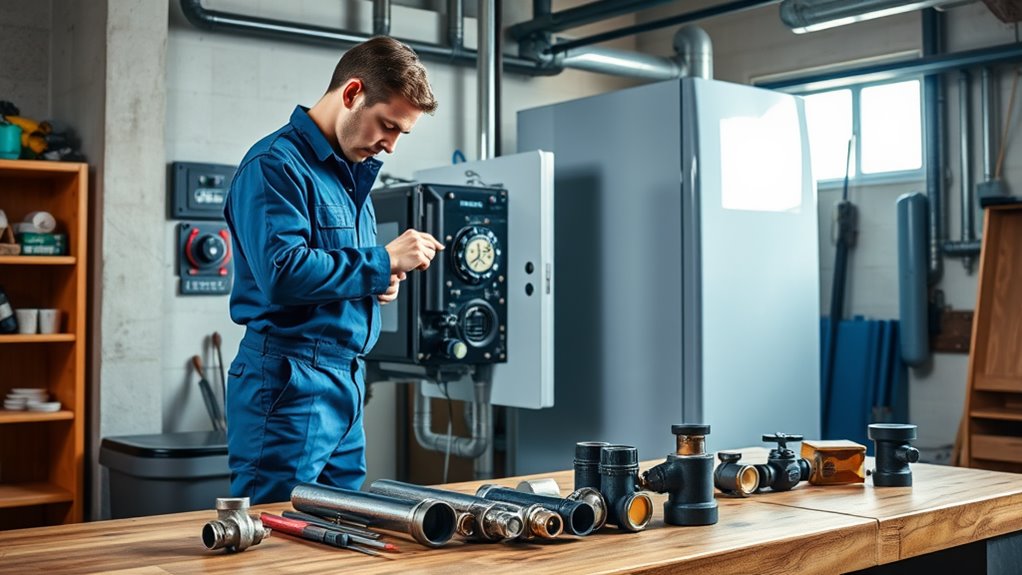
When considering a new boiler, which type best suits your needs? You've got two popular options: combi boilers and system boilers. Combi boilers are compact, providing instant hot water and heating without the need for a separate tank. They're ideal for smaller homes or apartments, as they save space and are energy-efficient. On the other hand, system boilers require a hot water cylinder but not a cold water tank, making them suitable for larger homes with higher hot water demands. They deliver a steady supply of hot water to multiple outlets simultaneously. By understanding the differences between these two types, you can make an informed choice that aligns with your specific heating and hot water requirements. Additionally, considering the energy efficiency of the boiler can lead to significant savings on energy bills.
Factors Influencing Installation Time

Several factors can greatly influence how long it takes to install a boiler, so understanding these elements is essential for planning your installation.
- Installation Complexity: If your setup requires extensive plumbing adjustments or electrical work, expect longer installation times.
- Boiler Type: Different types of boilers, such as combi, system, or regular boilers, have varying installation requirements, impacting the overall timeline.
- Existing Infrastructure: The condition and configuration of your current heating system can affect how quickly new equipment can be integrated. Additionally, regular servicing is crucial for maintaining energy efficiency during the installation process.
The Typical Installation Process
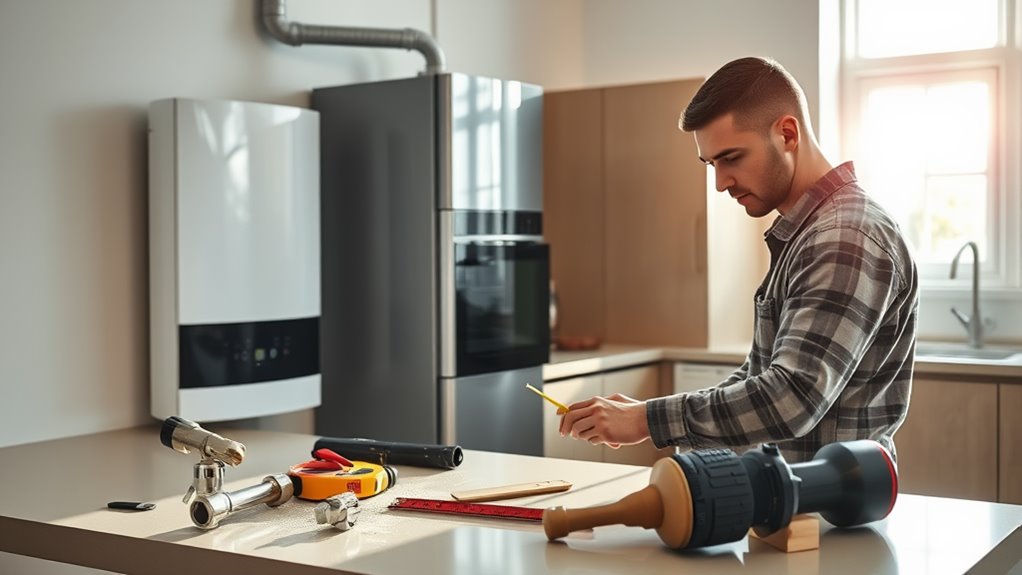
While the timeline for boiler installation can vary, understanding the typical installation process helps set realistic expectations. First, your technician will assess the existing system and determine equipment requirements, such as the boiler type and necessary fittings. Next, they'll prepare the area by removing the old unit and disconnecting utilities. Once that's done, they'll install the new boiler, ensuring it meets all safety regulations. This includes connecting water, gas, and electrical lines. After installation, the technician will conduct tests to confirm the system operates efficiently. Finally, they'll walk you through the controls and maintenance tips. Overall, a standard installation timeline can range from a few hours to a full day, depending on complexity and any unforeseen issues. Additionally, it's essential to consider the importance of regular maintenance to prolong the lifespan of your new boiler and ensure optimal performance.
Preparing Your Home for Installation
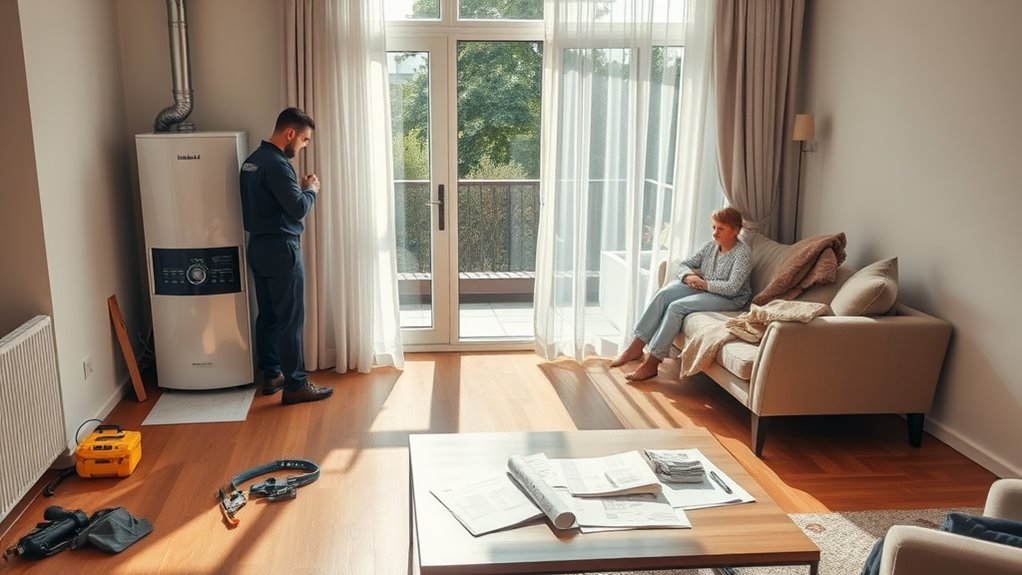
Preparing your home for a boiler installation is essential to guarantee a smooth and efficient process. To make certain everything goes smoothly, follow these steps:
- Clear the Boiler Location: Remove any furniture or obstacles around the designated boiler location. This guarantees easy access for the installation team and minimizes risks.
- Improve Home Accessibility: Make sure pathways are clear and well-lit, allowing technicians to move freely. This includes clearing hallways and entry points.
- Check Utility Access: Ascertain that gas, water, and electrical connections are accessible and in good condition. This will speed up the installation and help avoid potential complications. Additionally, ensuring compliance with safety standards is crucial for a safe installation process.
Post-Installation Considerations
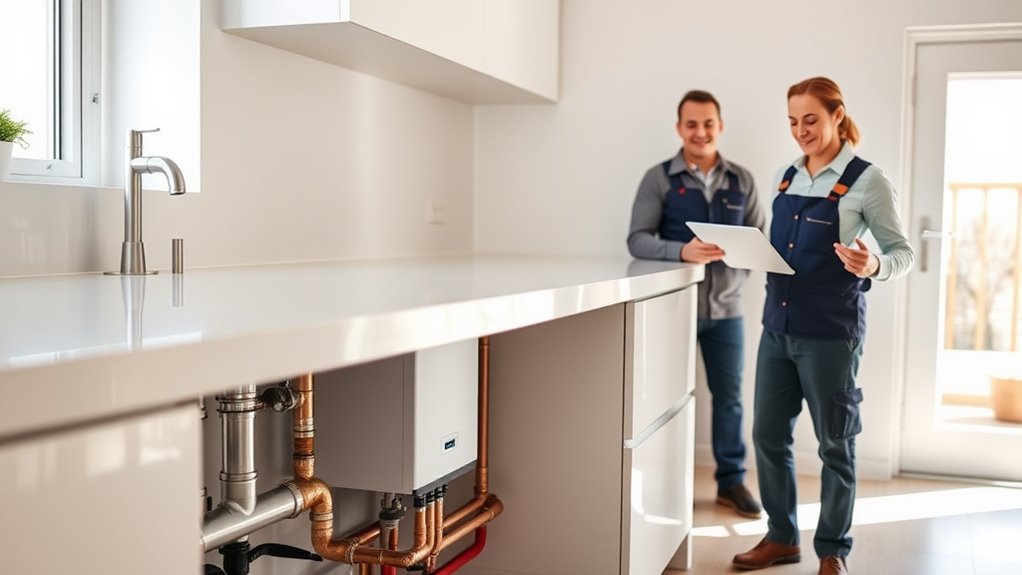
Once your new boiler is installed, it's vital to follow specific post-installation considerations to guarantee peak performance and longevity. First, check the pressure gauge; it should typically be between 1 and 1.5 bar. Next, familiarize yourself with the thermostat settings to optimize energy efficiency. Regular post-installation maintenance is important—schedule annual servicing to make sure that your boiler operates safely and efficiently. Pay attention to any unusual noises or leaks, as these can indicate potential issues affecting boiler performance. Additionally, consider installing a water softener if you live in a hard water area, as this can help prevent scale buildup. Conduct routine inspections to ensure that all components are functioning correctly. Finally, always keep the manufacturer's guidelines and warranty terms in mind to avoid voiding coverage.
Frequently Asked Questions
What Is the Average Cost of Boiler Installation?
The average cost of boiler installation varies based on boiler types and the complexity of the installation process. Typically, you'll spend between $3,500 and $7,500, including both the unit and labor. High-efficiency models may cost more upfront but can save you money on energy bills over time. It's crucial to get multiple quotes and consider additional factors, like existing infrastructure and necessary permits, to guarantee you're making an informed decision.
Do I Need to Be Home During the Installation?
You don't necessarily need to be home during the installation, but your presence can help address any questions or concerns. Home requirements often include providing access to the installation area and guaranteeing the space is clear. If you're not home, make sure to communicate any specific instructions to the installers. They're trained to work independently, but being available can facilitate smoother communication and guarantee the installation meets your expectations.
Can I Use My Heating While the Boiler Is Being Installed?
While your boiler's being installed, you typically can't use your heating. It's essential to explore heating alternatives or temporary solutions during this period. Consider electric heaters or portable radiators to maintain warmth in your home. Make certain these options are safe and energy-efficient to avoid excessive costs. Your installer should inform you about the estimated installation time, allowing you to plan effectively and stay comfortable while awaiting your new boiler's setup.
What Happens if My Installation Takes Longer Than Expected?
If your installation takes longer than expected, you might face installation delays, which can disrupt your heating schedule. These delays could lead to additional costs, especially if extra labor or parts are needed. It's crucial to communicate with your installer regularly to understand the reasons for any hold-ups and to discuss potential costs. Staying informed can help you manage expectations and prepare for any unforeseen expenses that may arise during the process.
Are There Any Warranties on Newly Installed Boilers?
Yes, there are boiler warranties available on newly installed units. Most manufacturers offer warranties that cover parts and sometimes labor for a specific period, typically ranging from 1 to 10 years. Additionally, installation guarantees from your contractor may provide extra peace of mind. It's essential to read the warranty terms carefully to understand what's covered. Always make certain your installation complies with manufacturer guidelines to maintain these warranties.
Summary
To summarize, while fitting a boiler in a day is possible, several factors come into play, including the type of boiler and your home's specific requirements. By understanding these variables and preparing adequately, you can streamline the installation process. Always consult with a qualified technician to guarantee a safe and efficient setup. Post-installation, don't forget to schedule regular maintenance to keep your boiler running smoothly and efficiently for years to come.

